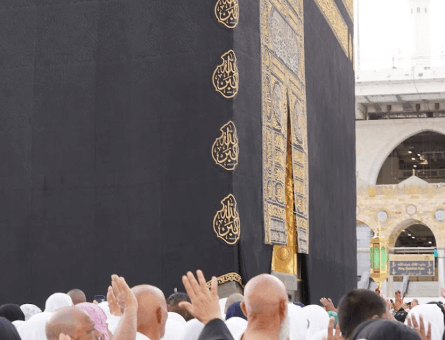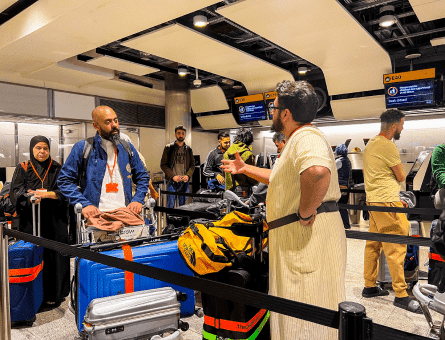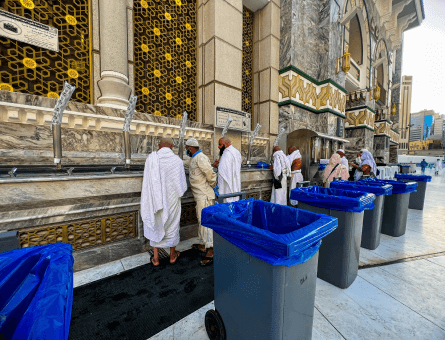Can a Woman Go To Umrah Without Mahram In Islam? – Complete Guide
Umrah is a holy pilgrimage performed by Muslims to Mecca, Saudi Arabia. It is a spiritual journey that involves visiting sacred sites and performing rituals. However, there are certain rules and regulations that one must follow while performing Umrah.
One of the most common questions that arise is, can a woman go to Umrah without a mahram in Islam? In this article, we will discuss the concept of mahram in Islam, the rules and regulations of Umrah for women, and the importance of a mahram.
What Is a Mahram?
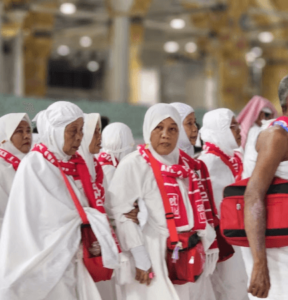
Mahram is an Arabic word that refers to a male guardian who is a close relative of a woman. A mahram can be a father, brother, uncle, grandfather, or son.
The purpose of a mahram is to protect and accompany women on their journey, especially during Hajj and Umrah. Islam emphasizes the importance of a mahram for the safety and security of women.
The concept of mahram is based on the Quranic verse, “And when you ask [the Prophet’s wives] for anything, ask them from behind a screen. That is purer for your hearts and their hearts” (Quran 33:53).
Importance of a Mahram
The requirement for accompaniment of a mahram for a woman is an essential part of Islamic law, and it is mandatory for a woman to have a mahram while traveling. The primary purpose of a mahram is to provide security and protection to a woman.
Hajj and Umrah are physically demanding pilgrimages, and it is crucial to have a male companion to assist with any difficulties that may arise during the journey.
Additionally, the presence of a mahram ensures that a woman is not exposed to any harassment or unwanted attention.
In all cases, travelling with a mahram better ensures a woman’s safety and thus their peac of mind and this is not something one would want to comprimise when completing the holy pilgrimage.
Umrah Rules for Ladies Performing Hajj Without a Mahram
In Islam, a mahram is a male non-marriageable relative who accompanies a woman on her journey to perform Hajj or Umrah. However, there are some exceptional cases where a woman can perform Umrah without a mahram.
Can You Do Umrah by Yourself?
The answer to this question is no. It is mandatory for a woman to have a mahram while performing Umrah. According to Islamic law, a woman cannot travel alone without a mahram. The reason for this rule is to ensure the safety and security of women.
Can a Single Man Perform Umrah?
Yes, a single man can perform Umrah without any restrictions.
45 Years Old Allowed to Go to Umrah Without Mahram
According to the Umrah rules for ladies, women who are over 45 years of age can perform Umrah without a mahram as long as they travel with an organized group or with their family members. Women who are under 45 years of age are required to have a mahram to accompany them. This rule applies to all Muslims around the globe, including those residing in the UAE.
This rule is in place to ensure the safety and protection of women during their journey to perform Umrah.
What Is the Difference Between Hajj and Umrah?
Hajj and Umrah are both Islamic pilgrimages to Mecca. However, there are significant differences between the two. Hajj is mandatory for every able-bodied Muslim who can afford it, while Umrah is optional. Hajj is performed during a specific time of the year, while Umrah can be performed at any time.
Hajj includes specific rituals in a number of locations that must be performed in a particular order, while Umrah only involves a few rituals in Mecca. Additionally, Hajj is a more physically demanding, bigger pilgrimage than Umrah.
Who Is a Mahram?
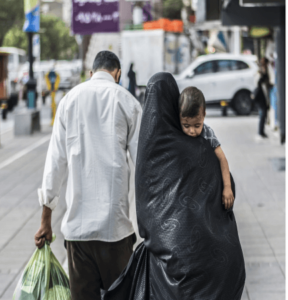
As mentioned earlier, a mahram is a male guardian who is a close relative of a woman. Here is a list of mahram as per Islamic law:
- Husband
- Father
- Brother
- Son
- Uncle
- Grandfather
Can I Perform Umrah with My Wife?
Yes, a husband can perform Umrah with his wife. A husband is a mahram for his wife, and therefore, he can accompany her on the journey.
Can a Woman Perform Umrah with Her Mother?
Yes, a woman can perform Umrah with her mother if she has a mahram.
Mentions of Mahram in the Holy Quran
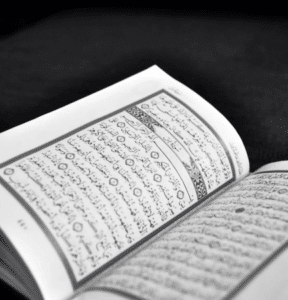
The concept of mahram is mentioned several times in the Holy Quran. Here is a list of some of the verses:
- “And marry not women whom your fathers married, except what has already passed; indeed, it was shameful and most hateful, and an evil way” (Quran 4:22-23)
- “Forbidden to you for marriage are your mothers, your daughters, your sisters, your father’s sisters, your mother’s sisters, your brother’s daughters, your sister’s daughters, your foster mother who nursed you, your sisters through nursing, your wives’ mothers, and your stepdaughters under your guardianship, born of your wives unto whom you have gone in. But if you have not gone in unto them, there is no sin upon you. And [also prohibited are] the wives of your sons who are from your [own] loins, and that you take [in marriage] two sisters simultaneously, except for what has already occurred. Indeed, Allah is ever Forgiving and Merciful” (Quran 4:23)
- “O you who have believed, do not enter the houses of the Prophet except when you are permitted for a meal, without awaiting its readiness. But when you are invited, then enter; and when you have eaten, disperse without seeking to remain for conversation. Indeed, that [behavior] was troubling the Prophet, and he is shy of [dismissing] you. But Allah is not shy of the truth. And when you ask [his wives] for something, ask them from behind a partition. That is purer for your hearts and their hearts. And it is not [conceivable or lawful] for you to harm the Messenger of Allah or to marry his wives after him, ever. Indeed, that would be in the sight of Allah an enormity” (Quran 33:53)
- “And marry not women whom your fathers married, except what has already passed; indeed it was shameful and most hateful, and an evil way.” [Surah an-Nisa 4:22]
- “And whoever emigrates for the cause of Allah will find on the earth many locations and abundance. And whoever leaves his home as an emigrant to Allah and His Messenger and then death overtakes him – his reward has already become incumbent upon Allah. And Allah is ever Forgiving and Merciful.” [Surah an-Nisa 4:100]
- “O Prophet, tell your wives and your daughters and the women of the believers to bring down over themselves [part] of their outer garments. That is more suitable that they will be known and not be abused. And ever is Allah Forgiving and Merciful.” [Surah al-Ahzab 33:59]
- “Forbidden to you [for marriage] are your mothers, your daughters, your sisters, your father’s sisters, your mother’s sisters, your brother’s daughters, your sister’s daughters, your [milk] mothers who nursed you, your sisters through nursing, your wives’ mothers, and your stepdaughters under your guardianship [born] of your wives unto whom you have gone in. But if you have not gone in unto them, there is no sin upon you. And [also forbidden are] the wives of your sons who are from your [own] loins, and that you take [in marriage] two sisters simultaneously, except for what has already occurred. Indeed, Allah is ever Forgiving and Merciful.” [Surah an-Nisa 4:23]
Important Hajj/Umrah Places
Here are some important Hajj/Umrah places:
- Mecca
Mecca, Saudi Arabia, is the most important city for Muslims as it is the birthplace of Prophet Muhammad (PBUH) and the location of the Kaaba.
- Kaaba
The Kaaba is a cuboid-shaped building located in the center of the Great Mosque of Mecca, considered the holiest site in Islam.
- Mount Arafat
Mount Arafat is located about 20 kilometers east of Mecca, and it is the place where Prophet Muhammad (PBUH) delivered his last sermon during his final pilgrimage. It is a significant part of the Hajj pilgrimage, and pilgrims gather here to pray and seek forgiveness.
- Masjid Al-Haram
Masjid Al-Haram is the largest mosque in the world, with a capacity of around 2 million worshippers. It is located in the center of Mecca and houses the Kaaba, which is the focal point of Hajj and Umrah. It is customary for pilgrims to perform Tawaf, which involves circumambulating the Kaaba seven times in an anti-clockwise direction.
- Mina
Mina is a tent city located about 5 kilometers east of Mecca and is where pilgrims stay during Hajj. It is also known as the City of Tents, and it is where the Stoning of the Devil ritual takes place.
- Safa and Marwa (Saee)
Safa and Marwa (Saee) is a ritual where pilgrims walk seven times between the hills of Safa and Marwa in the Masjid Al-Haram. It commemorates the story of Hajar, the wife of Prophet Ibrahim (AS), who ran between the hills in search of water for her son Ismail (AS).
- Al Masjid an Nabawi
Al Masjid an Nabawi is located in Medina, Saudi Arabia, and is the second holiest mosque in Islam. It is the burial place of Prophet Muhammad (PBUH) and his companions. Pilgrims often visit this mosque as part of their Umrah pilgrimage.
- Muzdalifah
Muzdalifah is located between Mina and Mount Arafat and is where pilgrims spend a night during Hajj. They collect pebbles for the Stoning of the Devil ritual and offer prayers before heading back to Mina.
Summary – Can a Woman Go to Umrah Without Mahram?
To finally sum up the answer to the burning question ‘Can a woman go to umrah without mahram,’ according to Islamic law, a woman cannot go to Umrah without a mahram. However, there are some exceptions to this rule. A woman can perform Umrah without a mahram if she is over the age of 45 and is accompanied by an organized group or her family.
It is important to note that the rules for Umrah may differ from those for Hajj, which is a mandatory pilgrimage for all Muslims who are physically and financially able to undertake it. Women are not allowed to perform Hajj without a mahram, and this rule applies to all women regardless of their age.
If you are a woman who wishes to perform Umrah without a mahram, it is advisable to consult with a religious scholar or authority in your community to seek guidance and advice. Additionally, it is important to ensure that you are familiar with the laws and regulations governing Umrah and to comply with them.
Performing Umrah is a significant religious obligation for Muslims, and it is important to approach it with the utmost respect, devotion, and preparation. Women should prioritize their safety and well-being during their pilgrimage and approach it with the utmost respect and devotion.
Explore The New Pilgrim App
The Ultimate App
for Hajj and Umrah!










